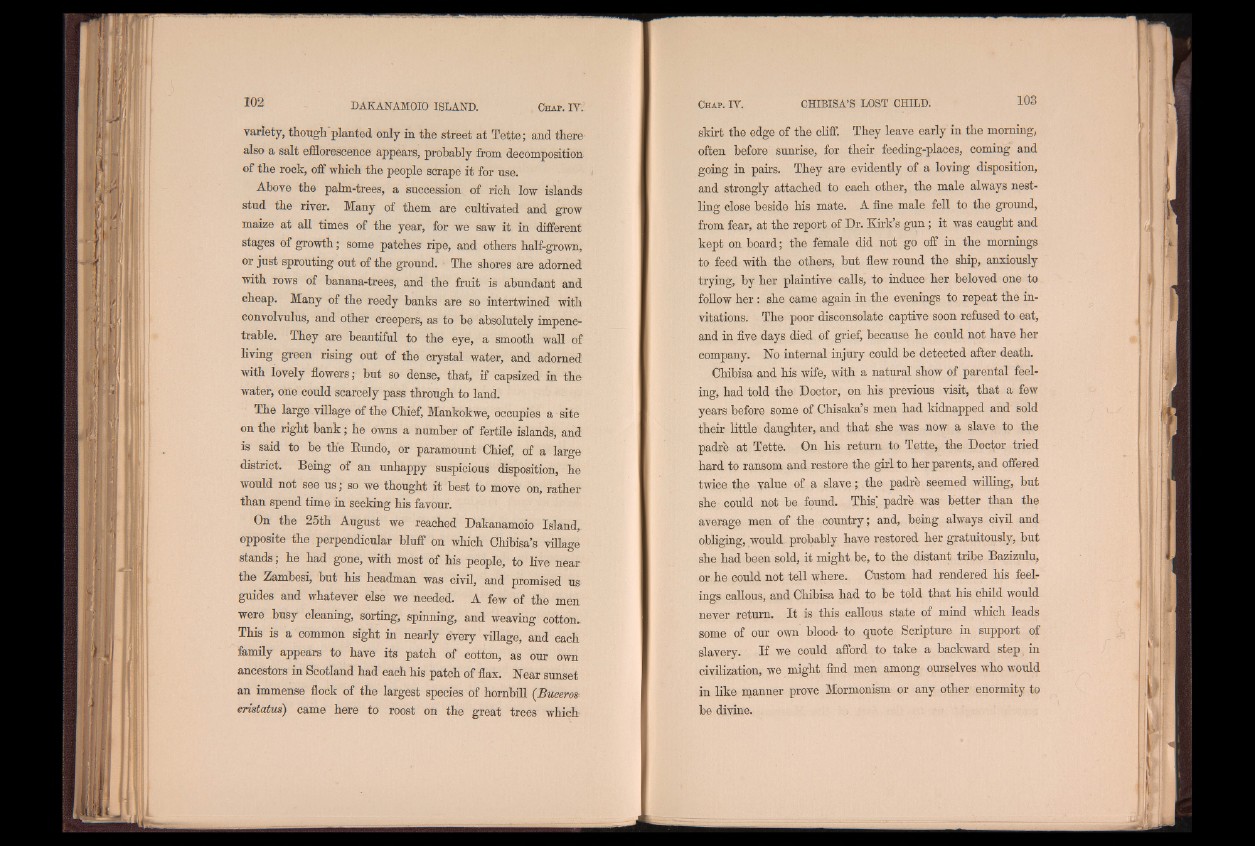
variety, though planted only in the street at Tette; and there-
also a salt efflorescence appears, probably from decomposition
of the rock, off which the people scrape it for use.
Above the palm-trees, a succession of rich low islands
stud the river. Many of them are cultivated and grow
maize at all times of the year, for we saw it in different
stages of growth; some patches ripe, and others half-grown,
or just sprouting out of the ground. The shores are adorned
with rows of banana-trees, and the fruit is abundant and
cheap. Many of the reedy banks are so intertwined with
convolvulus, and other creepers, as to be absolutely impenetrable.
They are beautiful to the eye, a smooth wall of
living green rising out of the crystal water, and adorned
with lovely flowers; but so dense, that, if capsized in the
water, one could scarcely pass through to land.
The large village of the Chief, Mankokwe, occupies a site
on the right bank; he owns a number of fertile islands, and
is said to be the Bundo, or paramount Chief, of a large
district. Being of an unhappy suspicious disposition, he
would not see us; so we thought it best to move on, rather
than spend time in seeking his favour.
On the 25th August we reached Dakanamoio Island,,
opposite the perpendicular bluff on which Chibisa’s village
stands; he had gone, with most of his people, to live near
the Zambesi, but his headman was civil, and promised us
guides and whatever else we needed. A few of the men
were busy cleaning, sorting, spinning, and weaving cotton.
This is a common sight in nearly every village, and each
family appears to have its patch of cotton, as our own
ancestors in Scotland had each his patch of flax. Near sunset
an immense flock of the largest species of hombill (Bucero»
eristatus) came here to roost on the great trees which
skirt the edge of the cliff. They leave early in the morning,
often before sunrise, for their feeding-places, coming and
going in pairs. They are evidently of a loving disposition,
and strongly attached to each other, the male always nestling
close beside his mate. A fine male fell to the ground,
from fear, at the report of Dr. Kirk’s gu n ; it was caught and
kept on board; the female did not go off in the mornings
to feed with the others, but flew round the ship, anxiously
trying, by her plaintive calls, to induce her beloved one to
follow h e r: she came again in the evenings to repeat the invitations.
The poor disconsolate captive soon refused to eat,
and in five days died of grief, because he could not have her
company. No internal injury could be detected after death.
Chibisa and his wife, with a natural show of parental feeling,
had told the Doctor, on his previous visit, that a few
years before some of Chisaka’s men had kidnapped and sold
their little daughter, and that she was now a slave to the
padre at Tette. On his return to Tette, the Doctor tried
hard to ransom and restore the girl to her parents, and offered
twice the value of a slave; the padre seemed willing, but
she could not be found. This', padre was better than the
average men of the country; and, being always civil and
obliging, would probably have restored her gratuitously, but
she had been sold, it might be, to the distant tribe Bazizulu,
or he could not tell where. Custom had rendered his feelings
callous, and Chibisa had to be told that his child would
never return. I t is this callous state of mind which leads
some of our own blood- to quote Scripture in support of
slavery. If we could afford to take a backward step in
civilization, we might find men among ourselves who would
in like manner prove Mormonism or any other enormity to
be divine.